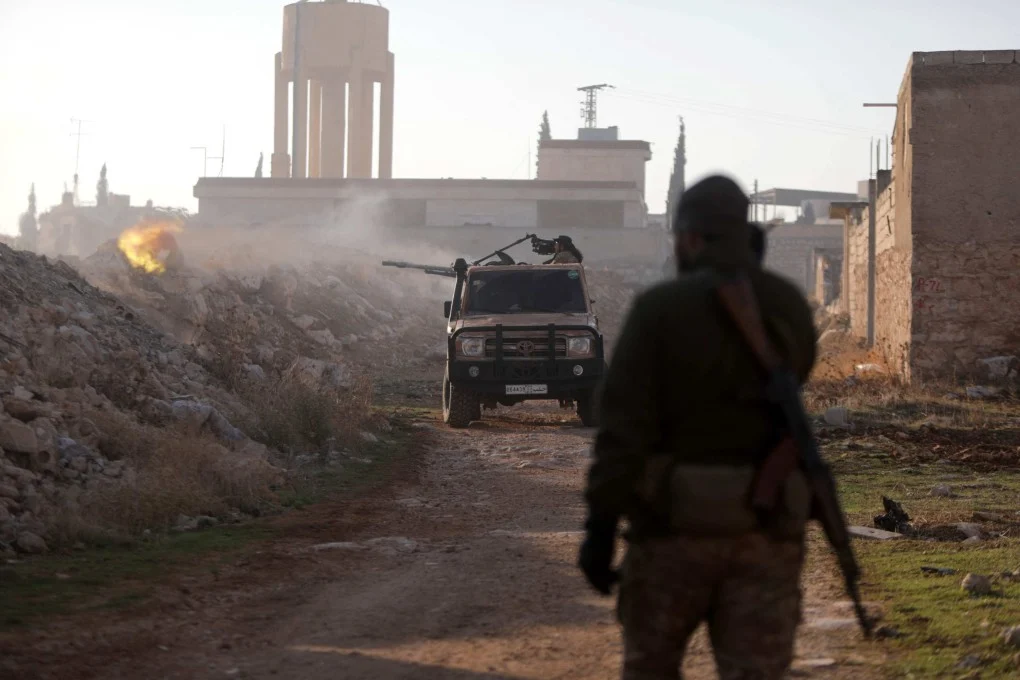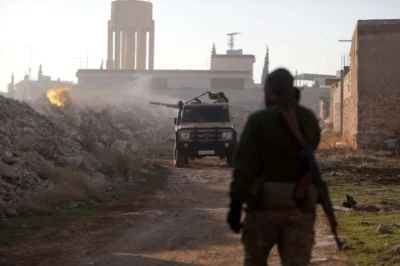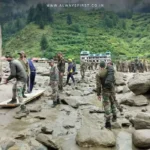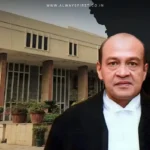
In a stunning development, a surprise military attack has ignited the frontlines of the Syrian civil war, which had largely been in a state of stalemate since 2020. The surprise assault has prompted an immediate response from the Syrian army, which has vowed to launch a counteroffensive against the forces responsible for the attack. This shift in the dynamics of the conflict, which had seemed to be entering a phase of frozen lines and relative calm in recent years, has raised fears of an escalation that could further destabilize the region.
The attack occurred early in the morning, when a combination of artillery shelling, airstrikes, and ground assaults targeted several key positions held by Syrian government forces along the frontlines in the northwest of the country. The surprise nature of the assault caught many by surprise, especially as there had been a longstanding expectation of relative calm since the last significant clashes in 2020.
Initial reports indicate that the attackers were a combination of opposition forces, potentially backed by foreign powers or militias with vested interests in destabilizing the region further. While details are still emerging, sources suggest that the assault was highly coordinated and strategically aimed at weakening government control over key areas.
Since the Syrian government’s recapture of most of the country’s territory, including strategic areas in the northwest and northeast, the Syrian civil war had largely quieted, with sporadic clashes and localized conflicts continuing in certain regions. The frontlines, especially in the northwest, had been largely frozen since a series of ceasefires brokered by international powers, including Russia and Turkey, in 2020.
The sudden resurgence of active conflict has jolted both local populations and the international community, many of whom had begun to believe that the civil war might finally be winding down. International organizations, including the United Nations and the European Union, have expressed concern over the renewed hostilities, with fears that the reactivation of the frontlines could result in further displacement of civilians and a worsening of the already dire humanitarian crisis.
The Syrian army, led by President Bashar al-Assad’s government forces, has issued a statement confirming that it is preparing for a counteroffensive. Military sources revealed that high-level meetings are being held to determine the best course of action, and reinforcements are already being mobilized along key fronts in the northwest.
The military spokesperson expressed confidence that the Syrian army could swiftly regain control of the affected areas, describing the attackers as “terrorists” seeking to destabilize Syria for foreign powers. “We are fully prepared to respond to this cowardly attack and restore security to the affected regions,” the spokesperson added.
The response from the Syrian government has also included a call for regional and international support in countering what it has described as “foreign-backed insurgencies” attempting to exploit the situation. This call for support comes amidst growing concerns that the war could spill over into neighboring countries, particularly Turkey and Iraq.
The international community has long been involved in the Syrian civil war, with various powers supporting different factions. Russia and Iran have been staunch allies of the Assad government, providing military support and aid to the Syrian regime throughout the conflict. On the other hand, the United States, along with European and Arab nations, has backed opposition groups and supported efforts to counter Assad’s rule.
This latest attack has raised suspicions of foreign involvement, with some analysts suggesting that the assault could have been supported or even orchestrated by external powers aiming to shift the balance of power in the region. While no concrete evidence has emerged to suggest direct foreign backing of the attackers, the well-coordinated nature of the attack points to a significant degree of external planning.
Turkey, which has had a significant military presence in the northwest of Syria since 2016, is particularly concerned about the recent developments. Ankara has supported certain opposition groups and is wary of Kurdish forces in northern Syria, who it sees as a threat to its national security. The Turkish government has been quiet on the attack, but analysts speculate that Turkey may be closely monitoring the situation, potentially using the renewed conflict to further its own interests in the region.
As with previous escalations in the Syrian civil war, the latest outbreak of violence has had a devastating impact on civilians caught in the crossfire. Reports from local sources indicate that dozens of people have been killed or injured in the attacks, with more casualties expected as the counteroffensive gets underway. The attacks have forced thousands to flee their homes, exacerbating the already dire humanitarian crisis in Syria.
Aid organizations have raised alarms about the difficulties of reaching affected populations, especially in areas where access has been restricted due to ongoing hostilities. The United Nations has called for an immediate ceasefire to allow for the delivery of humanitarian aid to civilians in need, while also urging all parties to respect international law and avoid further targeting of civilian infrastructure.
The situation is particularly dire in the Idlib province, where most of the fighting is concentrated. Idlib is the last major stronghold of opposition forces in Syria, and the province has seen a large concentration of displaced people from other regions of the country. The renewed conflict threatens to deepen the crisis in an area that has already been struggling with limited access to basic necessities such as food, water, and medical care.
The surprise attack has elicited reactions from key regional and global players. The United States has condemned the attack in the strongest terms, calling it an attempt to undermine regional stability and exacerbate the suffering of the Syrian people. Washington has pledged to continue its support for opposition forces in Syria and to work with its allies to ensure that the Assad government is held accountable for its actions.
European leaders have also expressed concern, with several countries calling for an emergency meeting of the United Nations Security Council to discuss the escalating situation. The European Union has reiterated its call for a peaceful resolution to the conflict, emphasizing the need for a political solution that addresses the grievances of all Syrians.
At the same time, Russia, which has been a key supporter of the Assad regime, has voiced its support for Syria’s response to the attack. Moscow has blamed foreign-backed terrorists for the assault and has called for stronger efforts to counter what it describes as “illegal militias” operating in Syria.
As the Syrian army prepares to launch its counteroffensive, the situation in Syria remains fluid and highly volatile. The next few weeks will likely be critical in determining whether the country can stabilize or if the renewed conflict will spiral into a more intense and widespread war. International actors will undoubtedly be closely watching the developments, as the outcome could have significant implications for the future of Syria, the region, and global geopolitics.
For now, the focus is on the ongoing efforts to secure the frontlines and minimize civilian casualties. As the military response unfolds, hopes for a return to stability in Syria seem increasingly uncertain, and the international community braces for the possibility of a more protracted and devastating conflict.









































Leave a Reply